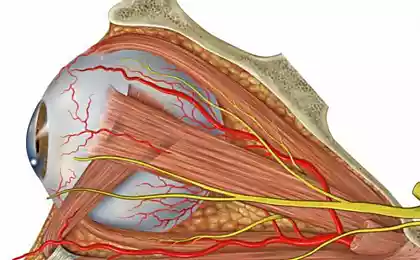804
Facts you never knew about yourself

The human mind remains one of the biggest mysteries in the world.
Although researchers have learned many interesting facts about the psychological characteristics of a person and can even predict our behavior, based on certain rules, much still remains unknown.
Did you know how wrong your memories, how long your habits are formed or the number of friends you can purchase?
The psychological processes of the person
1. Your brain is also active during sleep as during wakefulness
When you are asleep and dreaming, your brain processes and combines the experience of the day, creates associations of the information received, decides what to remember and what to forget. You probably often heard the advice "sleep well" before an exam or an important event. If you want to remember what you have learned, better just go to bed after you have learned the material and before you need to remember that.
2. You can remember only 3-4 elements simultaneously
There is usually the "magic number 7 plus or minus 2", according to which a person cannot hold more than 5-9 pieces of information at the same time. Most of the information in short-term memory is stored for 20-30 seconds, and then we quickly forget, but only if not repeated again and again.
Although most people can keep in mind about 7 digits for a short period, almost all of us hard to keep in mind the 10 digits.
Recent studies show that we are able to store even less: about 3-4 blocks of information simultaneously. And although we try to group data that is received, our short-term memory remains quite limited.
So for example the phone number is divided into several sets of numbers, in order that we could easier to remember.
3. We badly perceive the combination of red and blue colors
Although these colors are used in many national flags, red and blue color is hard perceived by our vision when they are next to each other.
This occurs because of an effect called "chromostereopsis", which leads to the fact that some colors "are", while others are removed. This causes irritation and eye fatigue.
Most strongly this effect is manifested in the combination of red and blue and red and green.
4. You see things differently than they are perceived
According to a study at the University of Cambridge, "nedavno in CACM podagra Pasolini of bkoby in sloe. SMOE vange is chatby of Parva and Pinesdale bcwwa blue swich matzah".
Even if the rest of the letters will be shuffled, you will be able to read a sentence. This is because the human brain does not read every letter but the word as a whole. It constantly processes information received from the senses and how you perceive information (words), usually different from what you see (matted letters).
5. You are able to hold attention for about 10 minutes
Even if you are in a meeting, you are interested in the topic, and people interested in the subject sets, the maximum attention that you are able to maintain it for 7-10 minutes. After that, your attention starts to weaken and you need to take a break to continue to hold your interest.
Human psychological characteristics
6. The ability to delay gratification appears from childhood
Your ability to delay immediate gratification of their desires occurs in early childhood. People who from an early age can delay gratification do better in school and better cope with stress and disappointment.
7. We daydream 30% of the time
Love in the clouds? According to psychologists, we all love to dream, at least 30 percent of the time. Some of us even more, but that's not always a bad thing. The researchers argue that people who love to dream, tend to be more creative and better solve various problems.
8. The habit is formed within 66 days
Scientists studying how long certain actions become a habit, found that on average it needs about 66 days.
The more complex the behavior that we want to acquire, the longer time we need. So, those who wanted to gain the habit of doing exercise, often required 1.5 times more time to make it automatic than those who have developed the habit of eating lunch fruit. Even if you miss a day or two, this will not affect the gaining of habits, but missed too many days in a row can slow down the process.
9. You overestimate your reaction to future events
We are not very good at predicting the future. To be precise, we overestimate our reaction to future events, whether pleasant or negative. Studies have shown that people believe that positive events such as marriage or a big win, will make them much happier than it actually happened. Similarly, we believe that negative events such as job loss or accident, cause we have a much greater depression than in reality.
10. You blame the other person and not the situation (and the situation, not yourself)
Remember when you were waiting for another person who was late for a meeting. Most likely, you have explained his delay irresponsibility and nesobrannosti. In this same situation my tardiness you blamed on external circumstances (traffic jams).
In psychology this is called "fundamental attribution error" – that is, the tendency to blame other people's behavior internal personality characteristics and their behavior — external factors ("I had no choice", "I was unlucky"). Unfortunately, even being aware of our tendency to make unfair judgments, we will still continue to make this fundamental mistake.
11. The number of friends you can have are limited
Even if you can boast thousands of friends in social networks, in fact they have much less. Psychologists and anthropologists have identified "Dunbar number" – that is, the maximum number of ties that man can have, and it is from 50 to 150.
12. You can't not pay attention to food, sex and danger
Have you ever noticed that people always stop to look at scenes of accidents. In fact, we cannot ignore the situation of danger. Each person has an ancient brain structure that is responsible for survival, and asks, "Can I eat this? Is it safe to have sex with this thing? Can this kill me?".
Food, sex and danger – it's all he cares about. Because without food people will die, without sex the race would not continue, and if the person dies, the first two points don't make sense.
13. You know how to do things never done before
Imagine that you've never seen an iPad, but you gave it and offered to read books on it. Before you turn on the iPad and begin to use it in your head already will model how to read with it books. You will have assumptions of how will look the book on the screen, what functions you can use, and how you will do it.
In other words you have a "mental model" of reading books from your tablet, even if you've never done. Your mental model will differ from the model that the person has read before e-books and those who do not know what the iPad.
Our mental models are based on incomplete facts, past experiences, and even intuitive notions.
14. You want more choices than you can handle
If you go into any supermarket, you will see a huge range of products, and because people need a large selection.
In one study conducted in the supermarket, the researchers provided the participants with 6 kinds of jam, and then 24 kinds of jams. And although people often stayed at the counter with 24 kinds of jam, they are 6 times more likely to buy jam on the counter with 6 types of jam.
It is easy to explain: despite the fact that we think we want more, our brains can only cope with a limited number of items at a time.
15. You are happier when busy with something
Imagine you are in an airport and you need to collect your Luggage. You will need about 12 minutes to get to the baggage claim area. When you get to the baggage carousel, you immediately take away your suitcase. How impatient are you feeling?
Now try to imagine a similar situation, but only you get to the tape issue for 2 minutes and wait for your Luggage 10 minutes. Although in both situations, the baggage claim took you 12 minutes, in the second case, you've probably been more impatient and unhappy.
If a person has no reason to be active, he decides to do nothing. And although it helps us to save energy, idleness makes us feel impatient and unhappy.
Brain and mind
16. Most of the decisions you take unconsciously
Although we like to think that all our decisions are carefully controlled and thought out, research suggests that everyday decisions are actually subconscious, and this is the reason.
Every second our brain is attacking more than 11 million individual pieces of data, and since we can't thoroughly checked in our subconscious mind helps us make the decision.
17. You alter their memories
We perceive our memories as a small "movies" that we lose in our head and believe that they are stored in the same way as the videos in our computer. But it is not.
Every time you think back to some event, you change it, as neural pathways every time otherwise aktiviziruyutsya. It can influence later events, and the desire to fill the gaps in memory. So for example, you don't remember who else was on the meeting of relatives, but since your aunt is usually present, you can include it in your memory.
18. You can't run several things at once
If you think it can perform multiple tasks at the same time, you are mistaken. Scientists have proven that we can't do 2 or 3 things at once. Of course, we can go and at the same time to talk with his friend, but our brain focuses on only one priority function at a particular point in time. This suggests that we cannot think about two different things at the same time.
19. What are your most vivid memories are erroneous
Memories of exciting and dramatic events in psychology called "memories - flashes", and they turned out to be full of errors.
Well-known examples of this phenomenon are the events related to September 11. Psychologists asked participants to describe in detail what they were doing where they were, and other details associated with this event, immediately after the attack and after 3 years. It turned out that 90 percent of later descriptions differ from the original. Many people are able to describe in detail where and what they were doing at that moment, when I heard the news. The problem is only that these details are wrong, as the strong emotions associated with memory, distort memories.
source
Source: /users/104
Bashkir student constructed a device to measure the thickness of fat
Endoscope with oxygen sensor detects pancreatic cancer























